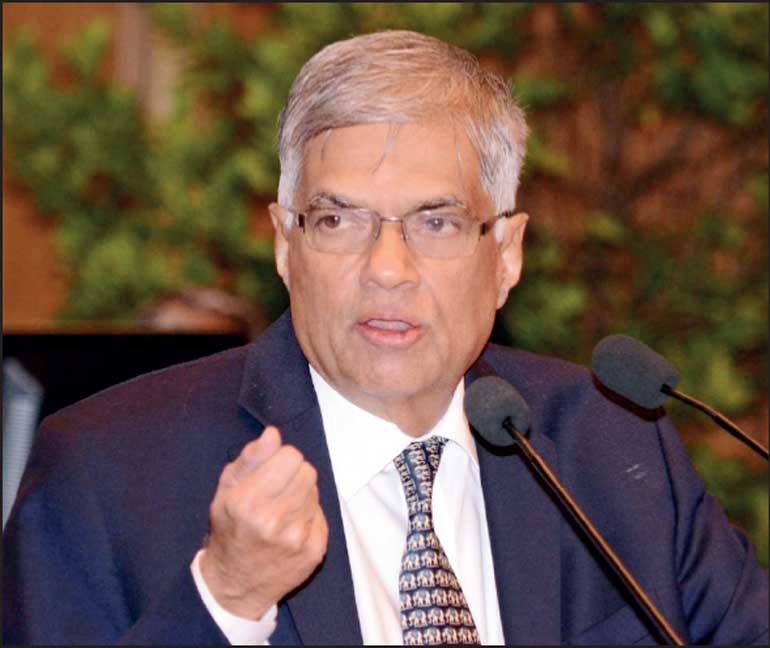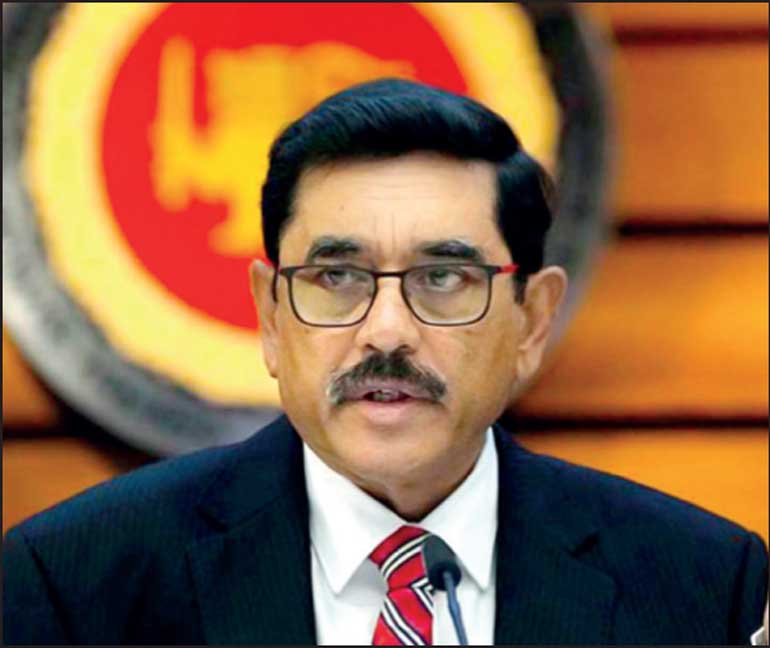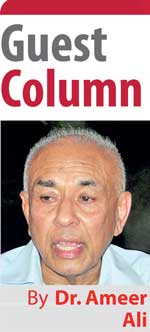Sunday Feb 15, 2026
Sunday Feb 15, 2026
Wednesday, 5 July 2023 00:05 - - {{hitsCtrl.values.hits}}

President Ranil Wickremesinghe

CBSL Governor
Dr. Nandalal Weerasinghe
 Domestic debt restructuring (DDR) is the second half of the debt restructuring (DR) strategy mooted by the IMF as precondition for its $ 2.9 billion Extended Fund Facility. CBSL Governor Dr. Nandalal Weerasinghe (NW) introduced the idea of voluntary domestic debt optimisation (VDDO), which confused the community and demanded clarification. Ultimately, when negotiations ended it became clear that it was a voluntary concession by CBSL and President Ranil Wickremesinghe (RW) to the banking and corporate sector and involuntary imposition to the working poor. It was an inequitable solution to an IMF imposed condition.
Domestic debt restructuring (DDR) is the second half of the debt restructuring (DR) strategy mooted by the IMF as precondition for its $ 2.9 billion Extended Fund Facility. CBSL Governor Dr. Nandalal Weerasinghe (NW) introduced the idea of voluntary domestic debt optimisation (VDDO), which confused the community and demanded clarification. Ultimately, when negotiations ended it became clear that it was a voluntary concession by CBSL and President Ranil Wickremesinghe (RW) to the banking and corporate sector and involuntary imposition to the working poor. It was an inequitable solution to an IMF imposed condition.
The specific objectives of VDDO according to NW are to bring down (a) the debt to GDP ratio from 128% in 2022 to 95% by 2032; (b) gross financial needs (GFN) from 34.6% to 13% of GDP by the same year; and (c) reducing forex debt servicing from its current 9.4% to 4.5% of GDP, also by 2032. The local banks were particularly worried when NW introduced the term voluntary, which to them must have implied a reduction in deposits and interest rates. But, true to their words, President RW and NW had voluntarily spared the banks from the DDO exercise.
Banks are understandably taking a sigh of relief and the Sri Lanka Banks Association (SLBA) is indeed congratulating the two big chiefs for their pro-corporate stance. NW justified the decision on the argument that banks were already carrying a significant burden of fiscal consolidation efforts and economic crisis, and their tax share had been in excess of 50% and contributing heavily to Government revenue. Along with SLBA, the Ceylon Chamber of Commerce (CCC) and the Joint Apparel Association Forum (JAAF) also joined in applauding the two chiefs.
However, what NW left unsaid was the political cost to RW of including the banking sector into DDO. Domestic banks, according to CBSL, manage a total of 57.2 million deposits in a population of 22 million people, at an average of more than 2 deposits per person. That figure will increase dramatically if one calculates that average per family. Therefore, drawing the banking into DDO would be politically damaging to RW’s aspirations to win popular mandate at the forthcoming presidential election. With that in mind and after receiving kudos from SLBA, CCC and JAAF, RW now appeals to them to be his campaign organs and educate their unionised workforce on the nuances of DDO and its associated fiscal manoeuvre. Therefore, the decision to dodge the banks and key components of the private sector was not a politically neutral one. It was a voluntary decision by NW and RW with political objectives.
But it is a different story with superannuation funds on which depends the economic wellbeing of 2.5 million working men and women. Their benefits according to one source had received an estimated 40% fall in recent years, because of currency depreciation and price hikes. These funds including EPF and ETF had invested heavily on treasury bills and T-bonds issued by CBSL. Currently they enjoy a 9% return and contribute about 14% to income tax revenue. In comparison, the banking sector contributes 50% insurance which is equivalent to 50% of total tax revenue. Overall, nearly 30% of the corporate sector is said to be paying 30% of tax revenue. Now, NW is offering these EPF and ETF a hard choice and calls that voluntary debt optimisation. Treasury Bills under DDO would be restructured and new bonds would be issued with less attractive terms and conditions, but the funds would continue to enjoy their 9% return. The choice for these funds is therefore to exchange the current bonds for the new ones or pay higher income tax.
How could anyone call this a voluntary exchange when a higher tax threat is being imposed over EPF and ETF if they don’t agree to the new arrangement? Even the superintendent of EPF seems to have been caught on the hop. It is therefore an involuntary DDO exercise with inequitable fiscal consolidation that puts an unfair burden on the working population. Even after this exercise, whether DDO would help the Government to increase its revenue from 8.7% of GDP in 2022 to 11.3% of GDP in 2023, as RW laid out in his budget, is questionable in the face of corrupt tax administration and cronyism.
Regarding the other half of DD that relates to foreign creditors, NW expects a 30% haircut from them. Sri Lanka should consider itself extremely lucky to receive even that amount of benevolence from foreigners given the global financial instability and economic slowdown. It is going to be a tough negotiation and SL may be compelled to offer more non-monetary concessions at the table to get some sort of debt relief. The largest creditor, China, although assures cooperation, has not revealed its bargaining chips. China would be anxiously waiting for information to leak out from the forthcoming meeting between RW and the Indian Prime Minister. SL owes $ 4 billion to India while China’s debt amounts to $ 7 billion. How the Paris Club would approach the issue depends on how the IMF and its chief shareholder US would play their cards. DD is unavoidably linked with geopolitics.
Meanwhile, NW also made another notable remark, which did not catch much media attention. To his credit, he said that “instead of cutting interest rates on T-bonds held by superannuation funds, the Government could have raised additional wealth tax amounting to 3.3% of total tax revenue to address the gap in gross financing needs”. RW would not dare introduce additional wealth tax because of his and the system’s class bias. IMF itself would not favour that suggestion, because according to its philosophy, it is the wealthy who lay the golden eggs. This is where the inequitable character of Government’s fiscal consolidation measures is most glaringly highlighted. Even in the case of DDO, corporate bond holders are spared while T-bonds with EPF and ETG are punished.
At the end of the day and after DR and DDO are completed, it will be the middle and lower-income groups that would suffer most in the post-DR era. When a system survives and thrives on the basis of inequality it is in the interest of that system to perpetuate that quality. What DDO had done is therefore not surprising. Broadening the tax base without introducing an additional wealth tax shows how inequitable the system is. RW hopes that the World Bank loan of $ 700 million recently approved under International Development Association would help soften the anger of sufferers and provide enough funds for budget support and social protection. The governing political culture and the economic system nurtured by that culture must be changed, and only the NPP of all opposition parties seems to think along that line. But the NPP too needs to clean up its JVP cupboard to win mass approval.
(The writer is attached to Murdoch Business School, Murdoch University, Western Australia.)